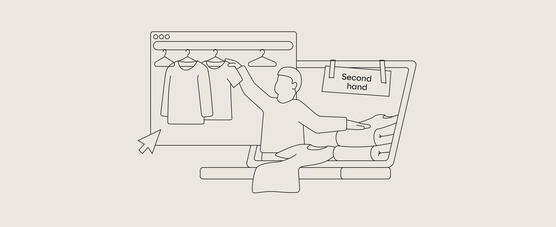percent are willing to share, swap, borrow, or buy used items more often. In 2013, only 52 percent of respondents were.
Sustainable consumption: Focus on effective commitment

What was once a trend is now a focal point of society. Consumers are paying more and more attention to sustainable and ethical standards when shopping. The Otto Group has been responding to this need for a long time and is committed to a more responsible form of business. And it will continue in that vein.
In recent years, ethical consumption has gone from being a trend to a demand. The Otto Group has driven this development for many years. In 2007, we commissioned our partner Trendbüro to conduct the first “Trend Study on Ethical Consumption.” Four further surveys followed (in 2009, 2011, 2013, 2020). We see it as our obligation to raise consumer awareness of this issue and respond to their wishes and needs. And our studies show that consumers consider environmental and social responsibility issues increasingly important when it comes to purchasing. In 2020, 70 percent of Germans said that ethical criteria played an important role in their purchasing decisions. That’s 6 percent more than in 2013. Further figures from the study (which surveyed 1,149 Germans between the ages of 14 and 70) show how much importance is now attached to sustainable business and conscious consumption.


“In the Otto Group, we want to make a difference because we have believed for generations that, in the end, the economy must serve the people, not the other way around. For that to happen, however, we all have to change. Away from a throwaway society, toward sustainable and recyclable products and resource-efficient production methods in which more consideration is given to human rights and in which respect and mindfulness toward nature are more highly valued,” says Otto Group CEO Alexander Birken.
We are committed to this in a variety of ways. For example, we are reducing our CO₂ emissions, supporting the sustainable production and use of cotton , and ensuring fair working conditions along our supply chains . Moreover, our Group companies are changing their business models toward sustainability and conservation of resources. Some examples:
Waste prevention
As an online retailer, OTTO cannot completely avoid packaging in its business area, but it can reduce the amount of waste and increase the recycling rate. To this end, the company is involved in numerous projects to use plastic bags made of recycled plastic, for instance, or cardboard boxes also made of recycled material.

percent are willing to pay more for climate-neutral products.
About You offers second-hand clothing on its website in the „Second Love“ category. The quality and authenticity of every dress, pair of pants, or accessory is checked beforehand. In this way, About You prolongs the use of high-quality clothing that might otherwise have been thrown away. And the online retailer enables its customers to purchase exquisite second-hand pieces at a reasonable price.
Longevity
Our consumption is always sustainable when we are not tempted to replace goods we already own with new ones, disposing of them because they are broken, because we no longer like them, or because they no longer meet our needs. Manufactum has always made sure that it sells products that are sturdy, perfectly designed, easy to repair, and that become lifelong companions for its customers. The company’s ambition is that every product sold has been manufactured in a resource-efficient and socially responsible manner and is durable and of regional origin.

percent think it is good to be able to buy or sell used items such as worn fashion items or old furniture.
percent of respondents plan to borrow more in the future.
Responsible production
Bonprix takes a multi-pronged approach when manufacturing its goods. For example, nearly 100 percent of its cotton already comes from sustainable sources. At its production sites, it ensures that workers are paid fairly, have regulated working hours, and work in a safe environment. And the goods are transported by ship rather than by air in order to save on CO₂e. Bonprix is aiming to be completely CO₂e neutral by 2030.
These examples demonstrate how the Otto Group is contributing to improving sustainability. And we will continue to expand our commitment. For our customers and to transform the economy.





